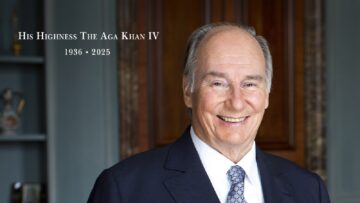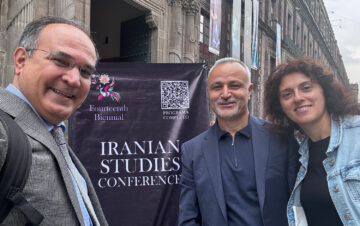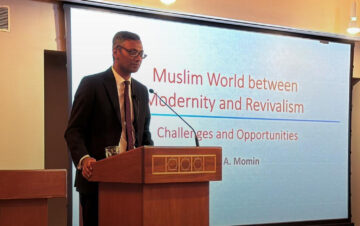The largest ever meeting of the Middle Eastern Studies Association of North America (MESA) took place in Washington, DC from November 23-26, 2002. This year’s conference attracted over 2,200 participants and provided a forum to share recent scholarship as well as showcase new art and cinema focusing on the Middle East and the Muslim world. “Identity and Community in Ismaili Societies” was the theme of the Institute’s panel.
Chaired by Dr Farhad Daftary, this panel explored the perseverance of Ismaili communal identities over the vicissitudes of time and geography. In the first of four papers, Dr Shafique N. Virani explored cultural and ideological constructions through the names used by the community for itself, as well as designations ascribed to it by outsiders. By surveying these markers of identity through history and space, Dr Virani laid a framework for understanding the relationship between religious communities and nomenclature. The papers that followed, provided case studies looking at identity negotiations in three different cultural and geographic contexts: Dr Sumaiya Hamdani explored negotiations of Shi’i Bohra identity in predominantly Hindu Gujarat in the 1920s; Alice C. Hunsberger explored how Nasir Khusraw’s poetry, philosophy and memory is intimately tied to Badakhshani Ismaili identity; and Rizwan Mawani studied negotiations of contemporary Ismaili identities in cyberspace.
Shafique N. Virani was also the recipient of an Honourable Mention for the 2002 Malcolm H. Kerr Award in the Humanities. The prize, given annually to the best doctoral thesis in Middle East Studies, was awarded to Dr Virani for his thesis entitled, “The Seekers of Union: The Ismailis from the Mongol Debacle to the Eve of the Safavid Revolution”.
The IIS also took the opportunity to present its research and activities to the Middle Eastern Studies academic community and to launch its latest publication: Civil Society in the Muslim World: Contemporary Perspectives by Dr Amyn B. Sajoo.
MESA, established in 1966 with fifty founding members, today has a membership of more than 2,600. Its annual meetings attract scholars from a variety of disciplines and fields who are interested in the study of the Middle East, North Africa, and the larger Muslim world. In addition to its annual meetings, MESA also publishes the International Journal of Middle Eastern Studies, in association with Cambridge University Press, and the MESA Bulletin.






